General
Joyce Mpanga: It was by luck that I made it to Makerere
Published
3 years agoon
By
Mak@100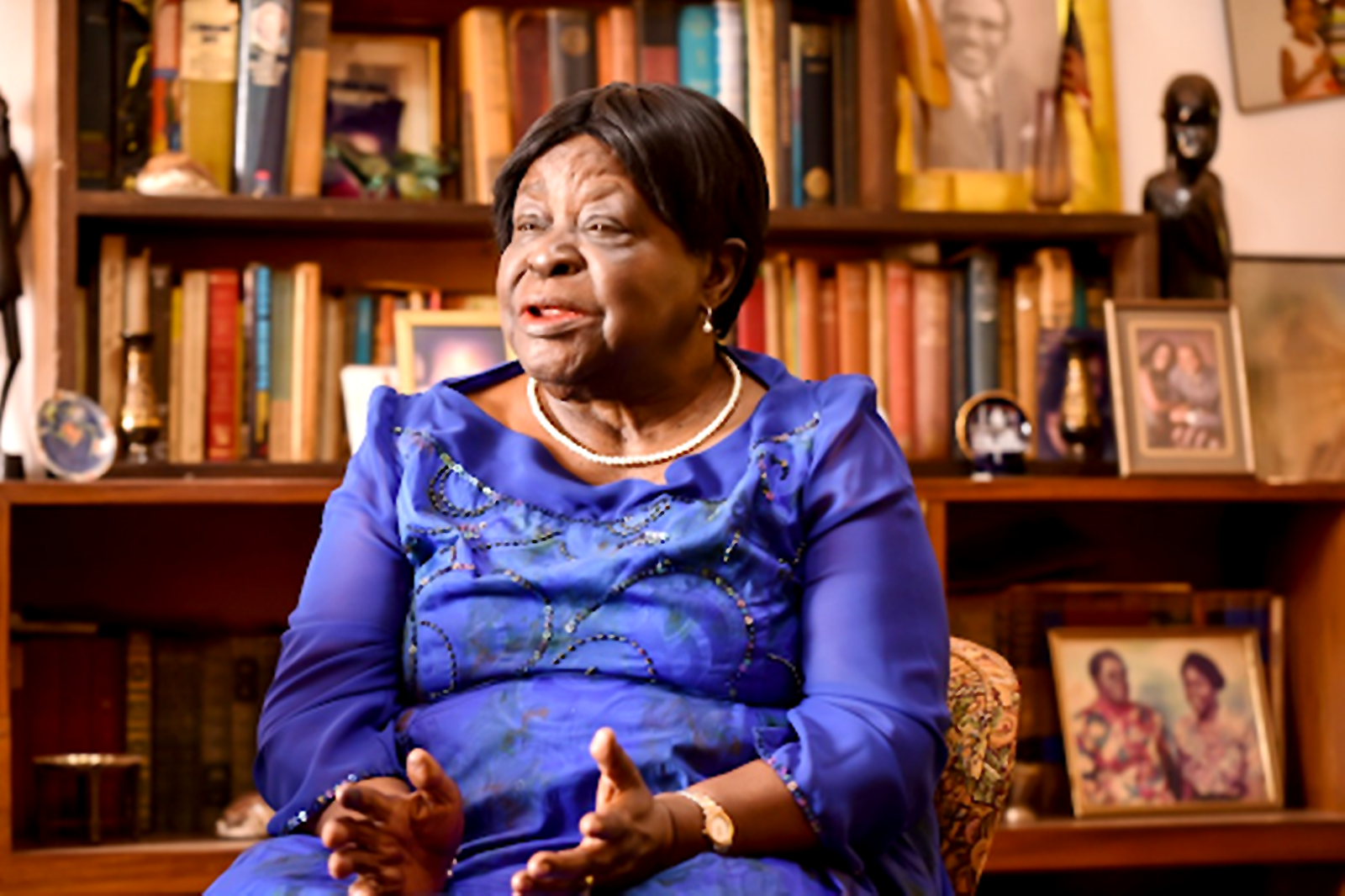
“Although there are a number of things today that don’t look like the Makerere I was in. The Makerere that I entered was extremely beautiful. We had beautiful lawns and there were very few but very beautiful buildings.”
At first, Joyce Mpanga wanted to become a nurse. But the dream never came to fruition as she was still young to get admitted, she had to stay at Gayaza High School and was automatically admitted to Makerere College in 1953, after passing Cambridge School Certificate that learners took after completing junior high school, equivalent to today’s O’level.
Mpanga graduated first in 1957 with a Bachelor of Arts. She spent another year at Makerere doing a post-graduate diploma in Education which she obtained in 1958. She was hired as a part-time teacher in Makerere College and later faculty of education.
A politician, women rights crusader and educationist in the past six decades, Joyce Mpanga is one of Makerere’s illustrious female alumni. As the university celebrates its centenary anniversary, it’s shining a light on alumni of her calibre. She is a woman of many firsts, including being the first African female lecturer in the faculty of education at Makerere University and Gayaza High School’s first African deputy headmistress.
Now in retirement and more than six decades after graduation, Mpanga recounted her times at Makerere in a recent interview. Makerere, she says, was a beautiful place. “I entered Makerere in 1953 and I graduated in 1958. I first graduated in 1957 with a Bachelor of Arts but then I did one other year of postgraduate diploma in education,” she says. Makerere College was at the time affiliated to the University of London, hence, the degree she received was from University of London.
In the interview, she gives nuanced tells of her time at the hill: being the only female in her Bachelor of Arts class as well as a number of university and national events that took place during that epoch of her life. Mpanga was admitted eight years after Makerere opened doors to female students. In the interview, she also talks about how she earned a job at Makerere as a lecturer.
Mpanga who had joined Gayaza High School in 1947 from Ndejje High with another girl. At Gayaza for junior one to junior three. After completing Junior three and passing continuation exams which learners sat at the time, she went for interviews at Mengo Nursing School in 1949. Other girls who she had applied with were admitted and started nursing training because they were strong enough to carry patients. Mpanga was at the time 15 years old. “They told me that if I like nursing, I can go back and come back later,” she says. She wondered what to do. The other option was King’s College Budo which had started admitting girls in 1934 yet she never wanted to go to Budo. “My father wanted to take me to King’s College Buddo but I didn’t want to leave Gayaza,” she says.
Entry to Makerere
At the time, she was joining what we now know as secondary level. As her parents were pondering on what do, Gayaza decided to start senior secondary level which had to run for four years which she completed in 1952 after passing Cambridge School Certificate. At first, Miss Cox who was the headmistress of Gayza didn’t know whether the students were good enough for Cambridge School Certificate. The headmistress took them to a girls’ only school in Kenya to compare standards which she found that her students were good. Miss Cox became confident thus deciding to present them to Makerere the exams which they passed.
When results were released, Ms Cox was confident that Mpanga and another girl would be admitted to Makerere. Indeed, they were admitted after submitting their certificates to Makerere.
“I remember when my father visited the school, Miss Cox told him that they were going to try and see if Makerere could take me,” Mpanga says. Makerere accepted to admit her together with another girl from Gayaza and one from Trinity College Nabbingo.
“The headmistress sent a teacher to come to my home and inform us that I had been given a place at Makerere. Everybody was excited. The school was excited. My parents were very excited and so was I,” she says.
At Makerere, entrants first did what is now known as two years of Advanced Level (A level) and then studied a degree or a diploma. Degrees were both for sciences and arts. And the diplomas were for education, agriculture and veterinary. In the second year of A Level, students who were to join the degree, London intermediate exams set by University of London while for the diploma, exams were set by Makerere College.
To sit University of London intermediate exams, a student must have passed English at O-level, Mpanga says. “Being admitted for the intermediate exam meant that I had passed with a good credit in English,” she says.
In the first year of A Level, the three girls Mpanga entered Makerere with–one from Gayaza, another from Trinity College Nabbingo and a third one from Kenya–were told that they weren’t going to present them for the University of London intermediate exam. Instead, they were going to take the Makerere higher Arts and go into diploma courses. “They went into education for two years and came out with a diploma in education and that too was quite high for anybody at that time,” she says.
Mpanga sat University of London intermediate exams which she passed and enrolled for Bachelor of Arts. Makerere was then a college that awarded University of London degrees. For the degree, she studied English, history and sociology.
Life as a student
With three other female students she joined with going for diploma, Mpanga became the only woman in the degree intermediate class. And it was the first time she was studying with males. But during the two years of intermediate for degree entry, everybody was telling her to opt for diploma arguing that she wasn’t going to pass. Male students were telling Mpanga that intermediate was going to be very difficult for her. They were also telling her it had even been difficult for male students.
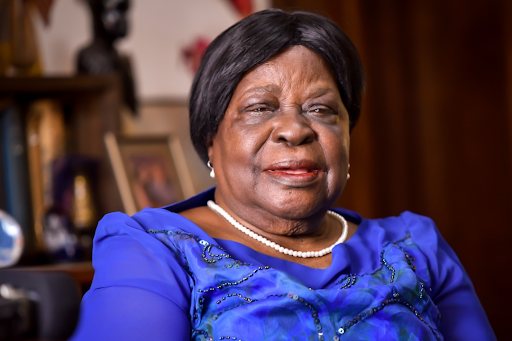
“The intermediate one was the first time I studied with men and of course the men who were discouraging us. All the time they would say that you are a girl and you can’t make it. They would just be surprised to see that you’ve made it,” she says. In the degree class, Mpanga says, “I was used to studying with boys. They used to tease me and I would tease them back.”
Mpanga contemporaries at Makerere included, Prof. Namboze Josephine, the first female student to graduate with a medical degree from Makerere University. She was also the first female medical doctor in Eastern Africa. “She was very hard working as I remember,” Mpanga says.
Nambooze’s time at Makerere: https://100.mak.ac.ug/a-dance-at-state-house-sharing-a-class-with-male-students-east-africas-first-woman-medical-doctor-tells-her-makerere-story-%ef%bf%bc/
At the time she joined, the University Guest House was the girl’s dormitory. There were only 13 girls in the university. They later moved to Mary Stuart Hall, whose construction started in 1947. When Mpanga left Makerere in 1958, there were about 50 female students. Male and female students were treated equally, Mpanga says, except that boys were allowed to get into their halls by midnight, girls had to be in their dormitory by 10:30PM.
The famous undergraduate red gown was in use during the 1950s. It was mandatory for students to don the gown whenever they went out of their halls at night or wherever they went out of campus. Makerere students were very highly respected, Mpanga says. But they also respected themselves. “We had our own self-respect, I am a Makerere student. I can’t do this. Like I see sometimes students moving from Wandegeya, eating maize on the way, how could a Makerere student eat while walking on the street? That was below us,” she says.
Into University politics
Mpanga was always interested in politics. There was a guild which was made up of representatives from halls of residences. Each hall had to send three or four representatives to the guild. “Since I was interested in politics from the beginning, I used to be one of the people who represented Mary Stuart in the guild,” she says. Students campaigned for leadership positions but she says they did not involve outside political parties as it is today.
But as it is today, students took keen interest in national politics by following activities of political parties such as Democratic Party and Uganda National Congress (UNC), the first political party in Uganda formed in 1952. Political parties used to hold meetings where the old bus park is now, Mpanga says. “There was a tree which they called omuti gwe dembe. Politicians from different political parties used to hold mass meetings there. And I remember we used to run and go and listen to them,” she says.
Unlike today when a semester can’t elapse without students’ demonstrations, there were no strikes at Makerere during Mpanga’s time. The last strike had taken place in 1949. And that’s when Abu Mayanja was expelled from Makerere for leading the strike over food. However, Mpanga says there were tense moments such as the deportation of the kabaka Mutesa II in 1953 that nearly led to a demonstration.
On the day the Kabaka was exiled, she says, students were gated in their dormitories to ensure that they don’t move out. But male students forcefully moved out and went outside near the female students’ hall, calling ‘Abana ba BUganda, come out.’ The girls too moved out. They moved to the arts building lower lecture theatre and started shouting out what they were going to do. “We decided on a number of things. One was that we shall never stand up when they’re singing God, save the Queen,” she remembers.
The Queen of England together with the duke of Edinburgh visited Uganda in 1954. As part of the trip, they were supposed to visit Makerere, open the Arts building and plant two trees in the Arts Building quadrangle. It was the reason why the Arts building was christened the Queen’s Court. The Queen’s Makerere visit never took place. Instead students were selected to go to Entebbe and meet the Queen and her entourage. It’s the students who got the trees, brought them to Makerere and planted them on behalf of the Queen and the Duke.
Loyalty to Buganda kingdom mattered for students like Mpanga, hence snubbing the opportunity to go to Entebbe and meet the Queen. “I was not one of the students who went to meet them. I can say that I was fairly political and politics outside concerned me. My kingdom Buganda had refused the Queen,” she says.
Graduation, return to Makerere
Mpanga graduated in 1958 with a Bachelor of Arts and a diploma in Education. “And I remember one, one newspaper put in with ‘a double smile for a double entry’ because I got my diploma for education,” she says. Mpanga completed the degree in 1957. It took a year between students completing the degree course and when they graduated because their results had to be verified and approved by London University. She spent the would be year of waiting studying the postgraduate diploma. Her graduation brought excitement in her family and village.
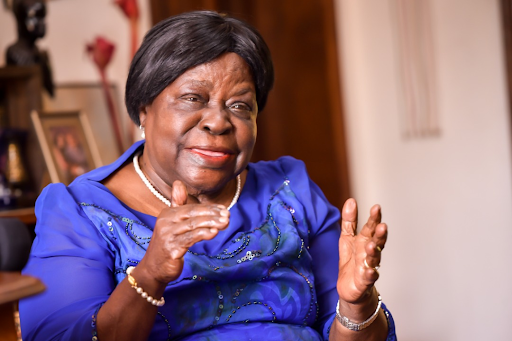
“My family was very excited. In fact, I had a death in the family. One of my brothers died. If that didn’t happen, I don’t know what I would have done with all my relatives, because the whole village was saying, ‘we are going to hire a car and see how our daughter is being crowned.’ Many did not come,” she says referring to the graduation day.
However, her mother and about ten other relatives attended the graduation. Each graduand would be given two invitation cards but Mpanga says she secured more cards from Tanzanian and Kenyan students whose parents were not coming for graduation.
Mpanga had got a first-class diploma in education. And she was quickly earmarked to start teaching immediately after graduation. “They gave me a part-time lecture. I was actually a teacher in Makerere College School, but I also taught students who were in the faculty of education,” she says. “It was sort of saying, don’t go very far. We want you to get a second degree and be able to be appointed as a lecturer.”
It had been the same policy with other bright students such as Kenya’s former President Mwai Kibaki who was appointed part lecturer after graduation. Mpanga taught for one and half years and then went to do a masters degree in education at University of Indiana Bloomington campus in America. When she returned from America, there was no place in the faculty at that time. But Mpanga wasn’t short of offers because Gayaza wanted her as the first African deputy headmistress.
Mpanga took Gayaza high school offer but then after a short time Makerere advertised a temporary job in the faculty of education and the subject was exactly like she had done. This was 1964. She applied for it. Before sitting interviews, she had to get recommendations from the faculty. First, she went to professor Tom Watson who had taught her, and who had advertised the temporary job. The professor told her that the job had been advertised for a very experienced European woman. He told Mpanga that “you are already in a very good first class school as deputy headmistress.”
She went to another professor called Lucas requesting a recommendation. Professor Lucas had been Mpanga’s personal tutor when she was in faculty education. He gladly accepted to give her a recommendation, saying, “if we haven’t produced anybody who can lecture with us, what have we done?”
Mpanga sat the interviews together with other three applicants. She passed and was given the job. “I think I can say I was the first African woman as the lecturer. They were African men who were lecturers. But I don’t remember any woman who was a lecturer at that time. I started as a lecturer in 1964.”
She adds; “I felt proud. I won’t hide that. I felt proud because how many African lecturers were there?” Prof. Yusuf Lule, Makerere’s first black principal, was excited to have the first African female lecturer and didn’t want to let Mpanga go. When her 18 month contract expired, it was extended.
Mpanga stopped teaching in 1967 and went to Britain to stay with her husband who couldn’t return to Uganda following 1966 crisis in which prime minister Milton Obote abolished Buganda kingdom. Her husband was the kingdom’s attorney general in the 1966 crisis.
Final reflections
“I am very proud of Makerere,” she says, adding, “although there are a number of things today that don’t look like the Makerere I was in. The Makerere that I entered was extremely beautiful. We had beautiful lawns and there were very few but very beautiful buildings.”
As Makerere turns a century old and starts its next century journey, Mpanga says, “Makerere should keep that name as beautiful and as dignified as we used to have it.”
“We used to be very dignified and you always felt proud to come to Makerere. And of course, even those who are there now should be proud that they’ve made it.”
You may like
-


Over 9,200 to graduate at Makerere University’s 76th Graduation
-
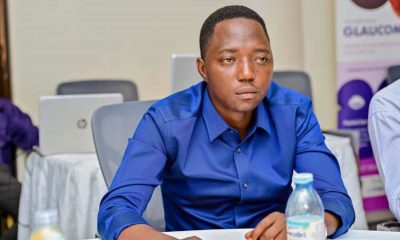

From Mastercard Foundation Scholar to Changemaker: Dr. Ekwaro Ronald’s Vision for Eye Health in Uganda
-
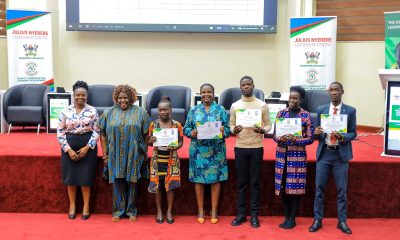

From Vision to Action: Five JNLC–UNDP Alumni Innovations Win Seed Funding
-
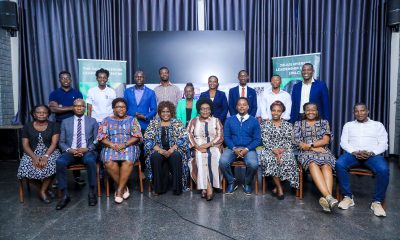

JNLC and UNDP Host Two-Day Community Innovation Showcase Featuring Impactful Alumni Projects
-


Meet Sedrick Nuwagaba, a Mastercard Foundation Scholars Program Alumni Contributing to Uganda’s Oil & Gas Industry
-
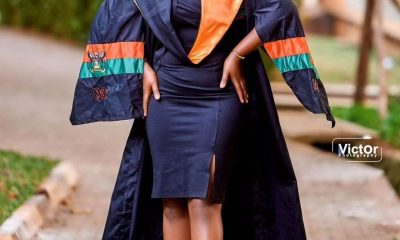

Impact Stories: Meet Malvin Akwara, a Mastercard Foundation Scholars Program alumna, who is dedicated to promoting inclusive education

It is with great pleasure that I welcome you to this edition of Mak News Magazine, a publication that continues to chronicle Makerere University’s journey as a centre of academic excellence, innovation, and societal transformation.
The stories featured in this issue vividly demonstrate Makerere’s unwavering commitment to addressing national, regional, and global challenges through research, partnerships, and people-centred solutions. They reflect a university that is deeply engaged with society, one that applies knowledge not only to advance scholarship, but also to improve lives.
A recurring theme in this edition is innovation for resilience and inclusion. From the College of Agricultural and Environmental Sciences’ Healthy Soy Initiative combating child malnutrition amid climate change, to the cutting-edge work of CEDAT’s Team Green Minds integrating IoT into agriculture, Makerere continues to harness science and technology to respond to pressing development needs. Equally inspiring is the College of Natural Sciences’ success in securing international funding to scale up fish processing technologies, with a deliberate focus on empowering women and strengthening livelihoods.
This issue also highlights Makerere’s growing role in advancing health and wellbeing. The launch of the Early Intervention Psychiatry Services Clinic at Makerere University Hospital marks an important step in strengthening mental health services, while the Hospital’s transformation from a modest sickbay into a centre of excellence stands as a testament to decades of strategic investment, dedication, and service to the nation.
Our commitment to education access and global engagement is equally evident. Strategic partnerships, such as that between the College of Education and External Studies and the Uganda Vocational and Technical Assessment Board, are expanding pathways to quality education. The establishment of the first-ever United States Studies Centre in the Great Lakes Region positions Makerere as a hub for dialogue, research, and policy engagement on global affairs. We also celebrate our vibrant international community, with graduates drawn from 67 nationalities—affirming Makerere’s status as a truly global university.
This edition further showcases initiatives that ensure long-term institutional sustainability, including the launch of the CoCIS Endowment Fund, infrastructure developments such as the modern hostel at Buyana Farm, and transformative programmes supported by the Mastercard Foundation that continue to empower young people across the continent.
As you read through these pages, I invite you to reflect on the collective effort of our students, staff, alumni, partners, and supporters whose contributions make these achievements possible. Together, we continue to shape Makerere University as a place where knowledge serves humanity.
I wish you an engaging and inspiring read.
Prof. Barnabas Nawangwe
VICE CHANCELLOR

The Board Chairperson of the Makerere University Endowment Fund (MakEF), Dr. Margaret Blick Kigozi, has urged graduands in Health and Life Sciences to uphold professional ethics and serve humanity with diligence and compassion.
Her appeal came during the passing out of graduates from the College of Natural Sciences (CoNAS), the College of Veterinary Medicine, Animal Resources and Bio-Security (CoVAB), the College of Health Sciences (CHS) and the School of Public Health (SPH) on Day Two of the 76th Graduation Ceremony of Makerere University.
“Class of 2026, you are now part of the Makerere legacy. Wherever you go clinics, laboratories, farms, boardrooms, or classrooms, you carry this institution with you. Serve your patients with skill and compassion. Care for animals and communities responsibly. Question boldly and keep learning,” Dr Kigozi, said.
Delivering the commencement address, Dr. Kigozi lauded the graduates for their dedication to careers that directly impact lives and communities. She encouraged them to use their knowledge generously and exercise their power gently.
“Your education has trained you to ask better questions. Your humanity must guide the answers. Never forget that behind every chart, every case, every animal, every experiment, there is life. And life deserves care, patience, and dignity. Give every person you come in contact with care, patience and dignity,” Dr Kigozi, noted.
As the graduates embark on their professional journeys, Dr. Kigozi emphasized the importance of cultivating basic business acumen and financial literacy to ensure sustainability in their work.

“You do not need to become accountants but you must be able to read the essentials: understand simple financial statements, budgets and key metrics so you can judge whether a clinic, lab, or program is sustainable. You are encouraged to start your business. There are numerous investment opportunities in your areas of training. You can provide services to our people and create jobs,” Dr Kigozi, said.
She shared candidly how, when she first stepped into leadership, she realised she did not understand balance sheets or budgets well enough. So, she returned to Makerere for short courses to strengthen herself.
“A well-run Hospital, clinic or lab delivers better outcomes, attracts staff, and secures funding. Business savvy is not only about profit, it’s about sustainability and the freedom to serve ethically and effectively. Carry clinical skill with business sense so your work endures and grows,” Dr. Kigozi, noted.
Quoting renowned writer and producer Shonda Rhimes, creator of Grey’s Anatomy, who once reflected that succeeding in one area of life can sometimes mean falling short in another, Dr. Kigozi encouraged women graduates to intentionally balance professional ambition with family responsibilities.
“When one area thrives, another is often under strain. When Navio was graduating from school I had to manage the Presidential Investor Round Table on the same day as Executive Director Uganda Investment Authority. I chose my job and delegated his siblings to attend Navios graduation. I learnt from this. I choose family always after that thing you achieve once and keep forever,” Dr Kigozi, said.
In his speech, the Prof Barnabas Nawangwe, the Vice Chancellor, informed the congregation that Makerere’s ranking on all university ranking platforms has remained stable, placing Makerere among the top 10 African universities and within the top 4.5% globally.
“In the Times Higher Education global ranking, Makerere University made a formidable jump from the 1200-1500 bracket to the 800-1000 bracket. This was no mean achievement and I congratulate all members of the Makerere Community on this stellar performance,” Prof Nawangwe, said.
General
Graduation marks the next phase of accountability, graduates told
Published
3 days agoon
February 25, 2026
“A degree is not a finish line. Graduation is not the end of learning, It is the beginning of accountability,” Prof. Nicholas Ozor, the Executive Director of the African Technology Policy Studies Network Nairobi, Kenya (ATPS), said.
Delivering a keynote address under the theme ‘Knowledge with purpose’, during Makerere University’s 76th graduation ceremony on Tuesday 24th February, Prof Ozor, challenged graduates to see their degrees not as status symbols, but as instruments of responsibility.
In his speech, he painted a candid picture of the world the graduates are stepping into, one marked by climate change, technological disruption, inequality, food insecurity and the rapid spread of misinformation. Yet rather than framing these challenges as obstacles, he described them as opportunities for purposeful leadership.
“Into this world, you step, armed with knowledge, credentials, and potential. Your degrees do not make you better than others. They make you responsible for others,” Prof Ozor, said.
Addressing graduands from College of Agricultural and Environmental Sciences (CAES)
College of Computing and Information Sciences (CoCIS), College of Education and External Studies (CEES) and School of Law (SoL), Prof. Ozor tailored his message to each field of study.
To graduates of the School of Law, he described the legal profession as a moral calling, urging them to use the law to protect the vulnerable and uphold justice with courage.
“Uganda, Africa, and the world do not need lawyers who only know how to argue. They need lawyers who know why they argue. Use the law to protect the weak, not intimidate them. Use your knowledge to defend justice, not delay it. Let integrity define your reputation not merely your résumé,” Prof Ozor, said.
For graduands who might feel that shortcuts will be tempting and silence will feel safer than truth, Prof. Ozor reminded them that justice does not need clever people, but courageous ones.
To the College of Education and External Studies, he underscored the transformative power of teachers, reminding them that classrooms shape nations long before policies do.
“Every nation rises and falls on the quality of its teachers. Never underestimate the power of a classroom. Teach not only for examinations, but for understanding. Teach not only content, but character. Teach learners how to think not what to think. Education is quiet work but its impact echoes across generations,” Prof Ozor, noted.
He called upon graduands from the College of Computing and Information Sciences, to use technology to solve African problems, not merely to imitate foreign solutions.
“Technology is powerful, but it is not neutral. Every line of code carries values. Every system you design affects real lives. Build for inclusion. Build for accessibility. Build for truth. Do not let innovation outrun ethics. The future will not belong to those who know the most technology, but to those who use it wisely,” He noted.
During the ceremony, Prof Ozor announced that the African Technology Policy Studies Network is offering PhD scholarships and postdoctoral fellowships in Artificial Intelligence, inviting deeper collaboration with Makerere.
For graduates of the College of Agricultural and Environmental Sciences, he highlighted their critical role at the intersection of sustainability and survival, calling on them to blend indigenous knowledge with scientific innovation to secure Africa’s food systems and protect its ecosystems.
In closing, he reminded graduands that their integrity will open doors their degrees cannot, their humility will teach them lessons success never will, and their resilience will matter more than their grades.
Five principles to be remembered:
- Embrace lifelong learning. The world changes too fast for static knowledge.
- Choose purpose over comfort. Impact matters more than income.
- Build character before career. Skills get you hired; character sustains you.
- Serve something larger than yourself. Give back to your communities and your country.
- Believe in Africa, and act. Do not wait for solutions from elsewhere. Be the solution.
Trending
-

 Humanities & Social Sciences5 days ago
Humanities & Social Sciences5 days agoMeet Najjuka Whitney, The Girl Who Missed Law and Found Her Voice
-

 Health1 week ago
Health1 week agoUganda has until 2030 to end Open Defecation as Ntaro’s PhD Examines Kabale’s Progress
-

 Agriculture & Environment1 week ago
Agriculture & Environment1 week agoUganda Martyrs Namugongo Students Turn Organic Waste into Soap in an Innovative School Project on Sustainable Waste Management
-

 General4 days ago
General4 days ago76th Graduation Highlights
-

 General1 week ago
General1 week agoMastercard Foundation Scholars embrace and honour their rich cultural diversity
